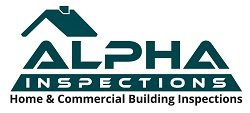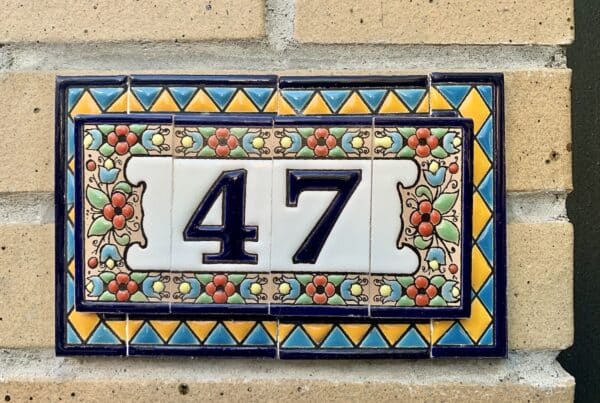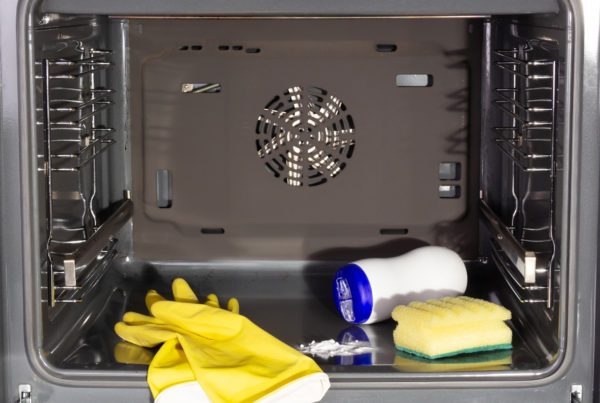
This guide answers the most common well inspection questions, with insights based on real inspections and state standards.
If a home relies on a private well for drinking water, a standard home inspection doesn’t cover everything you need to know.
A separate well inspection is essential (and in many cases, required) to ensure the system is safe, functional, and providing clean water.
Whether you’re buying a home with a well, already own one, or preparing to sell, it’s normal to have questions. How does a well inspection work? What does it include? And what happens if something fails?
What Is a Well Inspection and Why Is It Important?
A well inspection is a specialized evaluation of a property’s water well system. It looks at both the physical condition of the system and the quality of the water it delivers.
Unlike a municipal water supply, a private well has no city oversight. The homeowner is responsible for ensuring it meets health and safety standards. That’s why a professional inspection is important.
A well inspection typically includes:
- Checking the well cap, casing, and visible components
- Measuring water flow and pressure
- Testing water quality for bacteria, nitrates, and other contaminants
- Inspecting the pump, pressure tank, and wiring
- Reviewing system age, depth, and maintenance history
If problems are found, the inspector may recommend further evaluation or repairs before the home is sold or occupied.
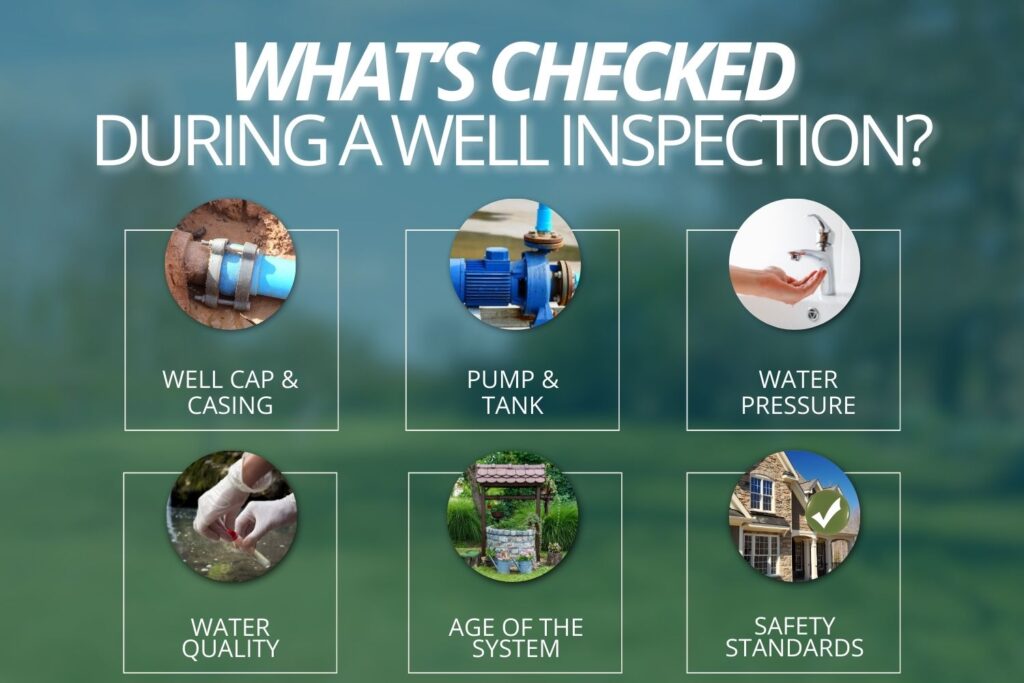
Is a Well Inspection Required When Buying a Home?
In most states, a well inspection is not legally required, but it may be strongly recommended by lenders, health departments, or real estate professionals.
For example, FHA, VA, and USDA loans often require water quality testing for homes on private wells. Some localities may also have rules about flow rates, setbacks from septic systems, or other safety requirements.
Even if not required, most buyers want peace of mind that the water system is safe and reliable. A well inspection can uncover:
- Old or damaged components that may need replacement
- Unsafe water conditions
- Low yield or poor flow rate
- Signs of contamination or structural issues
According to the CDC, more than 43 million people in the U.S. use private wells for drinking water.
Yet many of those systems are never tested unless a problem arises. A proactive inspection protects your health and investment.
What Does a Water Quality Test Check For?
Water quality testing is one of the most important parts of a well inspection. The exact tests may vary by location, but most include:
- Total coliform bacteria: These organisms can indicate contamination from soil or waste.
- E. coli: A sign of fecal contamination, which can pose serious health risks.
- Nitrates and nitrites: Often from fertilizers or septic systems, these can be especially harmful to infants.
- pH and hardness: These affect how the water tastes and whether it damages pipes or appliances.
- Lead, arsenic, or other heavy metals: In some areas, additional tests may be recommended.
The EPA recommends testing private wells at least once a year for bacteria and nitrates. However, testing may be needed more often if:
- There are infants or elderly people in the home
- You notice changes in water taste, smell, or color
- Flooding or septic issues have occurred
- The well hasn’t been tested in over a year
How Long Does a Well Inspection Take?
Most well inspections take between 1 to 2 hours, depending on the accessibility of the system and whether water testing is included on-site.
Water test results may take a few days if samples are sent to a lab. During that time, the inspector may provide a preliminary report based on physical components, pump output, and any visible concerns.
What Happens If There’s Well Trouble?
If a well system doesn’t meet recommended standards or fails a water quality test, it doesn’t automatically mean the sale will fall through. It does mean further steps are needed.
Depending on the issue, the inspector may recommend:
- Shock chlorination to disinfect the well
- Repairs to the pump, tank, or pressure system
- Installing filtration or treatment systems
- Sealing an abandoned well on the property
- Drilling a new well, in rare cases
The buyer and seller may negotiate repairs or credits, just like they would with other inspection findings. In some cases, sellers may handle repairs in advance to keep the transaction moving.
How Much Does a Well Inspection Cost?
The cost of a well inspection varies depending on the region and what tests are included. In most cases, a full inspection ranges from $300 to $600.
Water testing may be charged separately depending on the number of contaminants tested. Some states offer discounted or free water testing through public health programs.
It’s a smart investment. According to HomeAdvisor, the average cost to replace a well pump alone ranges from $900 to $2,500, depending on depth and type.
Spotting issues early through inspection is far more affordable than emergency repairs after purchase.
How Do I Know If My Well Needs an Inspection?
You should schedule a well inspection if:
- You’re buying or selling a home with a private well
- You’ve never tested the well, or it’s been more than a year
- Water pressure has changed or dropped suddenly
- You notice staining, odors, or unusual tastes in the water
- The well is more than 20 years old and has not been serviced
It’s also a good idea to test any time there’s nearby construction, flooding, or septic system problems. Wells can be affected by changes in the surrounding environment even if they seem to be working fine.
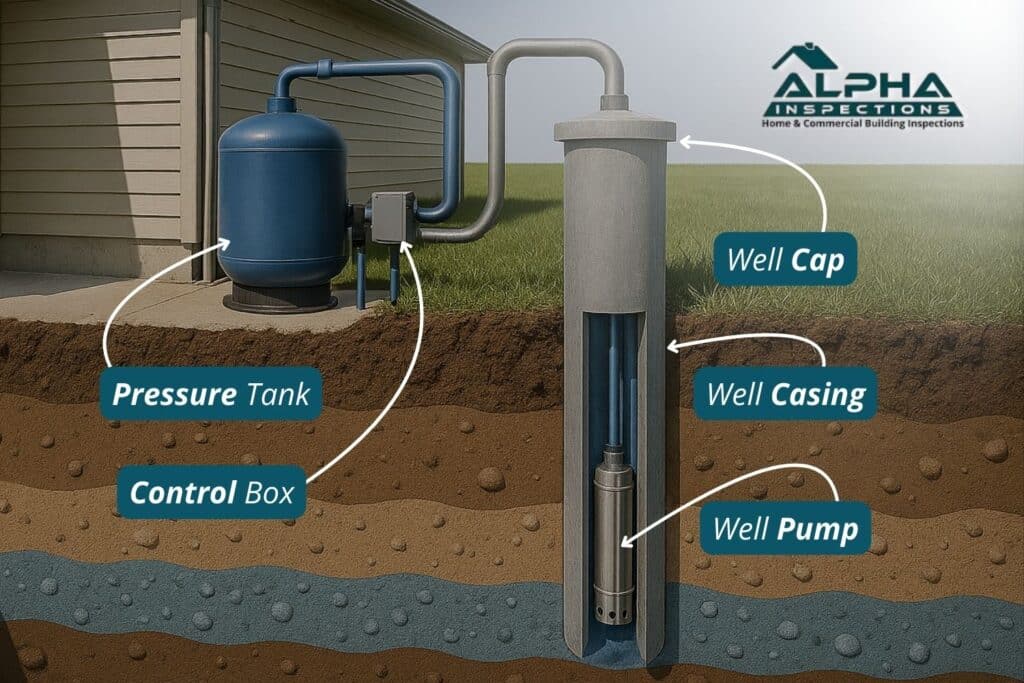
Other Common Well Inspection Questions
Does a regular home inspection include the well?
Not fully. A general home inspection may note pressure or visible issues, but it won’t include water testing or an in-depth look at the system. A separate well inspection is always a smart move.
What if the property has a well and a septic system?
That’s common, especially in rural areas. Both should be inspected separately to check for health and safety risks. Alpha can coordinate both as part of your full home inspection process.
Can businesses have wells too?
Yes. Commercial properties in rural areas often rely on private wells. We offer well inspections as part of our commercial inspection services, too.
When to Call a Professional
Whether you’re buying a home with a well or already rely on one for drinking water, it’s important to know your system is safe and up to code. A professional well inspection gives you clear answers about water quality, system performance, and potential risks.
Alpha Building Inspections offers well inspections for both residential buyers and property owners in New Hampshire, Maine, and surrounding areas. Our inspectors are trained to identify problems before they turn into health or repair emergencies.
If you’re unsure about your well’s condition (or just want to make sure everything’s working as it should) schedule an inspection today.
Conclusion
A well inspection is more than a box to check. It’s one of the most important steps for protecting your home, your water supply, and your family’s health.
By answering these common questions, we hope you feel more confident about what to expect and why it matters. If it’s been more than a year since your last test, or if you’re in the process of buying a home, don’t wait.
Contact Alpha Building Inspections to schedule a well inspection and get expert insight from a trusted, experienced team.
